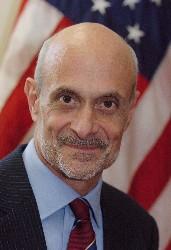Chertoff's plans for FEMA

From the BostonGlobe:
FEMA's focus
HOMELAND SECURITY Secretary Michael Chertoff has plans to weaken the Federal Emergency Management Agency as of Oct. 1. Hurricane Katrina ought to put a stop to that. The reorganization needs to be delayed until an independent commission determines what went wrong on the Gulf Coast.
Chertoff wants to eliminate the FEMA role in disaster prevention and have a separate office do its liaison work with state and local governments. This reorganization, planned before the hurricane struck, is supposed to focus FEMA on its core mission: responding to disasters. Elimination of powers diminishes agencies, however, not strengthens them.
After the Sept. 11 attacks, FEMA was subsumed in the Homeland Security Department, which focuses on terrorism. As Katrina demonstrated, a hurricane can pack even more destructive power than a jetliner, and, unlike a hijacking, cannot be prevented.
FEMA enjoyed its greatest influence under President Clinton when it was headed by James Lee Witt, a disaster specialist. President Bush appointed first Joe Allbaugh, then Michael Brown, to head the agency. Neither had experience with disaster relief. Early in his tenure, Allbaugh described FEMA as an oversized entitlement program. Its diminished stature was compounded by untested, unsympathetic leadership.
In just a week, FEMA has grown in importance. New York's Senator Hillary Clinton has called for it to be split off from the department and have it once again report directly to the president. Government agencies should not be moved around with every catastrophe. FEMA should stay where it is unless an authoritative inquiry finds otherwise.
House and Senate leaders yesterday announced an investigation into the Katrina disaster. Congress does need to examine the performance of FEMA, especially in light of the Chertoff reorganization plan. Given the partisanship in Washington, it may not provide convincing answers about the response to the storm.
Bush also promises an inquiry. The president is loyal to his appointees, but he needs to look dispassionately at Brown's performance, and if it is found wanting, he's got to go.
Effective disaster relief requires coordinated, quick action by federal, state, and local authorities. The response in New Orleans fell far short. To draw the proper lessons, Congress and the president need to appoint a truly independent, bipartisan commission to examine the response to Katrina and suggest improvements.
For most of the country, natural disasters pose a greater threat than terrorism. The Sept. 11 attack merited this kind of investigation, and so does Katrina.


0 Comments:
Post a Comment
<< Home